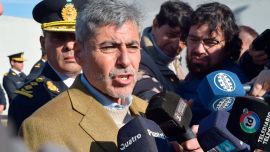Even Independence Day cannot interrupt New England academic Dr Hale’s obsession with Argentina. He writes:
“This Fourth of July I decided to give myself a holiday, keeping Argentina, Russia and everywhere else at a distance, but I went to this really good barbecue and all that meat soon had me thinking chorizo. Until then I’d actually been more interested in the other end of Latin America with Sunday’s election in Mexico. Which leads me to the reflection that with this AMLO populist coming on top of our Donald Trump, should they elect some wacko in Brazil in October, your President Mauricio Macri (who seems a pretty regular sort of guy) might start looking abnormal.
“Anyway my focus is back on Argentina but even though the World Cup distraction came to a crashing end last weekend, I don’t really see anything significant in economic trends any more than last week. My conclusion then that there was no news might seem odd when reached on a day with the steepest stock-market plunge in four years but it was neither eccentric nor ignorant. I was aware of the market turbulence on the day (the Merval index was down almost nine percent) but I reasoned that it was probably temporary and even if the decline were to prove more permanent, it had no particular Argentine angle of interest, merely reflecting a worldwide ‘flight to quality.’ As it happened, the fall proved temporary and reversible – a third of the loss was recouped the next day and even if shares were down again on the Friday, last Tuesday’s surge was almost as strong as the initial plunge. Share movements are always yoyos and I’ve never had any use for them as economic trend-setters. So what should be interesting me in the recent news?”
My reply:
“The dollar has remained lively despite that agreement with the International Monetary Fund (IMF) to reduce its scarcity value but I know that currency fluctuations do not interest you very much more than share movements. Just as French raids riddled the Argentine defence in the old Tartar capital of Kazan last weekend, so this agreement with an IMF headed by a former French economy minister is posing insoluble problems for policy-making. The basic dilemma is how to maintain the more realistic and competitive exchange rate needed to correct the balance of payments without causing stagflation via devaluation and soaring interest rates. Inflation (literally fuelled by surging world oil prices, hard to moderate amid subsidy reduction) looks sure to top three percent for last month when two percent had set alarm-bells ringing previously – the ‘recalibrated’ 2018 inflation target of 15 percent would thus be reached and exceeded in the first half of this year alone. That guideline has already been discarded for collective bargaining with 24-25 percent wage increases condoned for key unions like the teamsters and food workers – this is at least expected to attenuate the approaching recession.
“The force of that recession would seem belied by continually record revenue figures, which shot up by nearly 32 percent last month to reach almost 300 billion pesos – these are nominal increases, of course, but they are running ahead of inflation while the 48-percent increase in the IVA valueadded tax levied on sales would suggest a vibrant rather than depressed economy. But the basis of comparison is the same month last year so that strong growth in most of the intervening period (especially with reflationary pre-electoral policies) need not be incompatible with a future slump already starting last quarter. The alarmingly high trade deficit at least delivers a revenue plus in the form of June import duties rising almost as much as IVA (46.5 percent) while the value of export duties has almost doubled in peso terms – not only as a byproduct of devaluation but because a higher dollar triggered an explosion in June grain export sales to the tune of over US$3 billion, the highest monthly figure in a decade.
“I can understand your aversion to placing the focus on the dollar or share indices because the situation is nowhere near any point of equilibrium with constant lurches likely to continue interminably – until inflation and the fiscal deficit can be brought under control, Argentina will remain exceptionally vulnerable to a highly volatile world whose confidence in the reform commitments of Macri’s government seems to be dwindling in the wake of the currency crisis. If Macri has replaced printing money with borrowing abroad to bridge his deficits, then he obviously becomes more dependent on those creditors – and pledging austerity while dumping energy minister Juan José Aranguren (the unpopular figure responsible for the lion’s share of fiscal savings so far via the massive subsidy cuts from making gas, electricity and transport so much more expensive) did little to boost confidence. Anyway on the currency front, suffice it to say for now that the dollar brushed close to the 30-peso mark late last week but that the Central Bank under its new governor Luis Caputo took action to keep it well below that level – I can give you more details of those actions if required.
“Instead of the endless discussions over the best exchange rate to make the economy competitive, the debate needs to shift from monetary policy to productivity – which some estimate to be even lower than under the Peronist governments preceding the 1976 coup when full employment and high wages were at a premium. Major productivity gains in turn will only be possible with single-digit inflation and a serious currency to protect real wages. As the G20 chair Macri also need to keep inserting Argentina into the world so that the country can evolve out of consumer-led and into export-led growth – productivity specialists have calculated that exports would need to treble if Argentina is to aspire to the living standards of countries like Australia (with its quarter-century of consecutive growth) and Canada with which it was compared a century or so ago. More money also needs to be saved instead of spent with the investment rate rising by some 50 percent to a quarter of gross domestic product.
“It might be argued that Canada (which will co-host the World Cup in 2026) never made it into this year’s tournament while Australia was knocked out even sooner than Argentina. But then Jorge Sampaoli’s squad had little to write home about from Bronnitsy either.”




















Comments